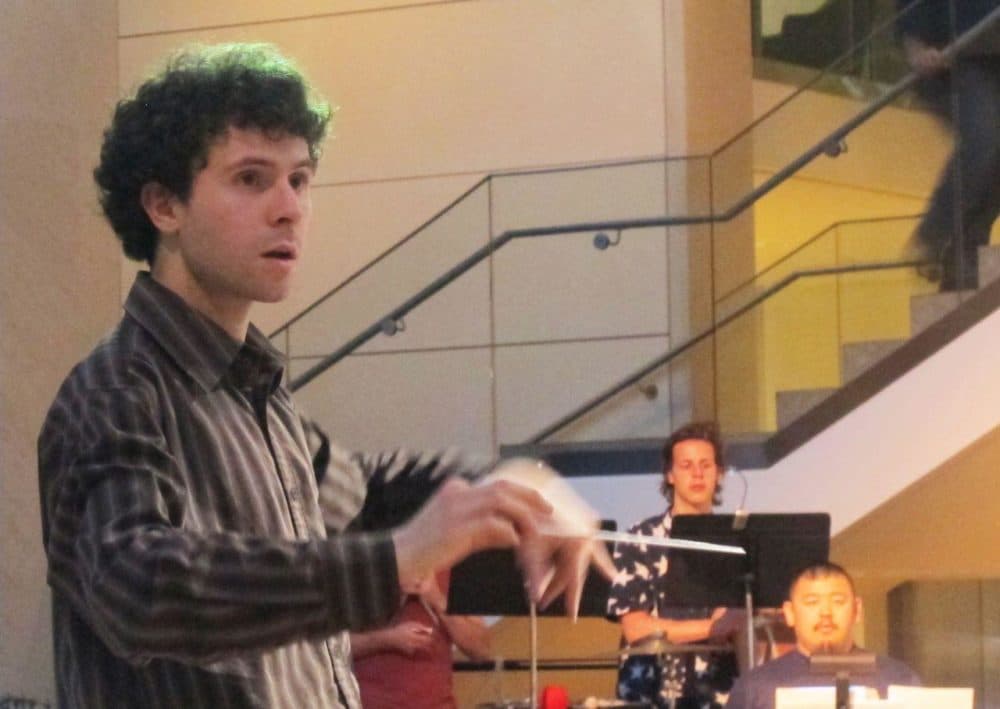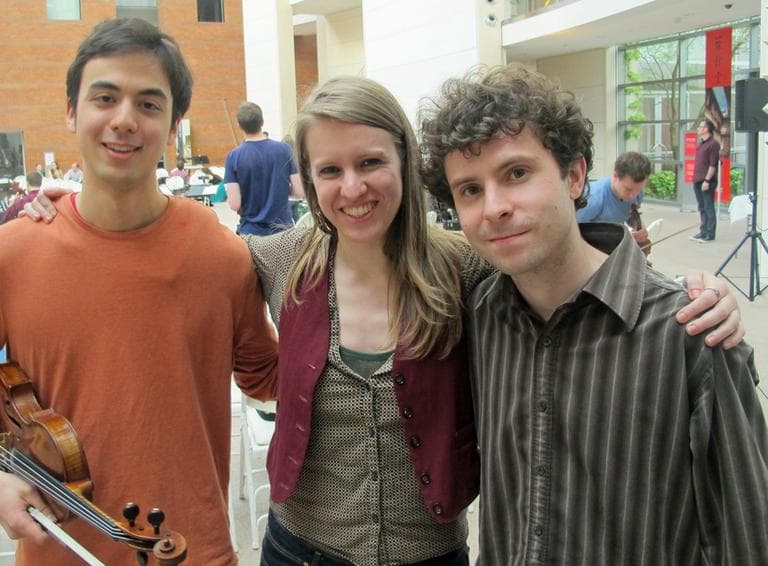Advertisement
Young Medfield Composer Is A Hot Commodity
There’s a rising star in the classical music and opera scenes: Matthew Aucoin, a 23-year-old composer/conductor who grew up in Medfield, Mass., has been called a modern-day Mozart. And his resume is impressive: assistant conductor at the Metropolitan Opera in New York, commissioned artist for the American Repertory Theater in Cambridge, and the Peabody Essex Museum’s first composer-in-residence. That’s where Aucoin debuted his first piece over Memorial Day weekend.

During a recent rehearsal at the museum, the composer-conductor bounced around the cavernous, glass and stone atrium coaching his musicians and vocalists.
Aucoin exudes authority, but he also looks boyish beneath his mop of brown curly hair.
"Some people come up to me and say I look like I’m 16, which they intend as a compliment," he said. "And I’m not ever sure how to take it."
Aucoin is not a teenager anymore, but it seems his youthful looks can work in his favor — or against it.
"One wants to look at least like one knows what one is talking about," he mused with a laugh.
Aucoin has been steeped in music from a very young age. His father, Don Aucoin, is a longtime Boston Globe drama critic and he grew up surrounded by art. In recent years, Aucoin learned his crafts — composition, conducting and poetry — from some of the best at the Metropolitan Opera, the Tanglewood Music Center, Juilliard and Harvard, where he graduated last year. Since then he’s been courted by some high-profile institutions.
"Oh, he’s definitely a dynamo," Juliette Fritsch, the director of education at the Peabody Essex Museum confirmed. "He’s in a lot of demand. We’re very lucky.
"Museums are always looking to attract a younger audience," she explained. "And I think classical music — I don’t think it’s a secret that it has a kind of challenge with its direct audience base. But this is definitely a new and different way of thinking and hearing about classical music."
Aucoin’s first composition as the museum’s composer-in-residence is called "This Same Light," and Fritsch said it breaks boundaries.
"If you think about the kind of traditional way that classical music is performed in an auditorium — everyone facing the same direction, you come in, the lights are on, you probably have a gin and tonic if you’re lucky," Fritsch said
Aucoin continued to paint a vivid picture, "You’re sitting 75 rows back between two people who are falling asleep, and another one who shushes you every time you move a muscle."
Aucoin rebels against that, asking his musicians to sit scattered among the audience. He inserts poetry and choreography so the players move about the room. The lighting is sophisticated — it illuminates the composer, who also conducts, sometimes up on his tippy toes. At times Aucoin looks a bit like a rock star in his ripped jeans and black sneakers.
"I expected to be identified as, like, an indie rocker if you asked me five years ago," he admitted.
Then, Aucoin says, he was listening more to bands such as Radiohead, Animal Collective and Wilco rather than Wagner, Beethoven or Berg.
"And there was a time — I’m talking when I was really young, like 11, 12 — when I just got a bit depressed by the way the classical music world functioned in relation to its audience and the way that kids my age were forced into playing music by their parents and so on," he recalled. "So I went off and mostly played jazz and rock for a few years, and I think it kept me from getting prematurely jaded, as so many of us composers do."
But he eventually turned back to classical because of its complexity. He wants to help other people from his generation care about the genre.
First violinist Keir GoGwilt is two years younger than Aucoin and said they connected over their passion for music and poetry as students at Harvard. Now, GoGwilt is playing the solo in Aucoin’s new concerto and calls Aucoin a natural collaborator.

"He never wants to own it himself, he always wants to share it," GoGwilt said. "And I think that’s one of the best parts of him as an artist."
The violinist said that translates into Aucoin’s scores and operas, along with his contagious energy.
Victoria Crutchfield, another friend from Harvard, is directing Aucoin's work at the Peabody Essex Museum. She says the young composer's music has a unique appeal for her.
"I mean, there's a lot of great contemporary music. There's also a lot of contemporary music that I wouldn't really care to listen to five times," she said. "His music, I would. And in fact when I worked with him in college on his first opera, 'From Sandover,' I really came to listen to that music and have done so many many times since."
Aucoin's time at Harvard was productive. That’s when A.R.T. artistic director Diane Paulus caught wind of the undergraduate she says people were calling “the next Leonard Bernstein.”
"The idea that you have a super talented artist who’s — whatever he is, I think 23 — exercising all of his musical talent and theatrical imagination into the opera form, and being excited about it theatrically, not just as music, is just exactly what the opera needs," Paulus said.
That's why Paulus commissioned Aucoin to write an opera for the A.R.T. marking the 150th anniversary of the Civil War. The work was inspired by the diaries Walt Whitman kept during his time as a nurse in the war.
Matt Aucoin admits he never expected to find success as a composer. But now, with lengthy gigs to create works with the A.R.T. and the Peabody Essex Museum, he says he's psyched to take as many musicians and listeners as possible along for the ride.
This program aired on May 27, 2013. The audio for this program is not available.
